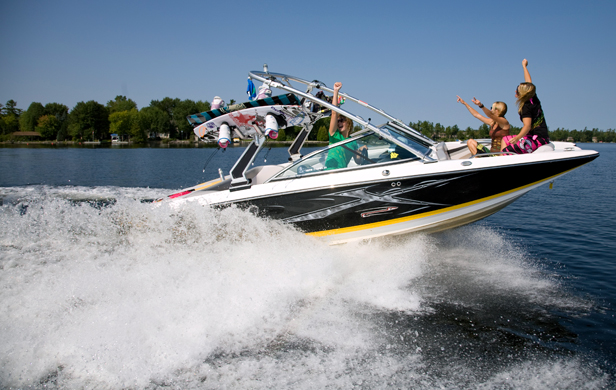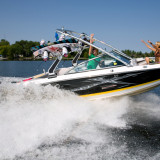
All across Canada, many small communities face great difficulties in trying to establish regulations regarding the protection of navigable waters environments – that is, waters which fall under federal regulatory jurisdiction, The Canada Shipping Act in particular.
Not only are these communities paralysed in their efforts to address the growing numbers of motorized boats on waterways, but they also find themselves helpless to deal with the proliferation of “Hummer” type boats, or wake boats, with their 330 horsepower (HP) to 550 HP engines. The powerful, destructive waves they generate cause shoreline erosion, damage docks, make non-motorized boating unpleasant and disturb shoreline enjoyment.
Laws don’t work
Unfortunately, The Canada Shipping Act is an inefficient tool to address the aforementioned challenges, because the Act, which dates back to the early years of Canada, was not conceived to protect the environment. More precisely, the prime purpose of the Act is to protect the rights of navigators and minimize barriers to navigation.
But the worst part about this Act is that it makes it exceptionally difficult for a local government to obtain federal approval for a new regulatory proposal – up to 5 years from the time a request is made to the moment when a proposal may be approved – and the guidelines on the Act make it abundantly clear that the federal government seeks non-regulatory solutions by way of voluntary codes of conduct.
The latter point is the source of eternal conflict within communities, as they must achieve nearly 100% voluntary adherence to a proposed code of conduct. Surveys and referendums are not regarded by Transport Canada as a basis for a community to formulate a new regulatory proposal.
Consequently, most communities are not able to follow through to achieve federal regulatory approval.
It is against this legislative backdrop that the matter of the proliferation of wake boats on Canadian waterways has contributed to community dialogues of the deaf over irresolvable conflicts.
New breed of boat
Wake boats are not at all like conventional motor boats. The combination of 1) horsepower ranges similar to those offered for Volvo tractor-trailer trucks and 2) ballasts ranging from 1,500 to 2,000 lbs, produce high, powerful waves, even at modest speeds.
As if this is not enough, the turbidity caused by wake boats churns up sediments and fuel consumption is in the stratosphere. With respect to the latter point, so much for tackling climate change!
For other water bodies, the depth and size of the lake may mean little environmental tolerance for any type of powerful boat. In BC, on the Shuswap River, the environmental challenges pertain to jet boats navigating up sensitive spawning habitats. These jet boats can travel upstream at high speeds in very shallow water.
To address the increasing environmental challenges posed by problematic boats, I was involved in forming the Canadian Coalition on problematic boats, otherwise known as The Coalition – officially created on September 1st in a small Quebec community, St-Faustin-Lac-Carré, Québec.
Coalition calls for legislative changes
In effect, the Coalition wishes to see modifications of two pieces of legislation, the Fisheries Act and the Canada Shipping Act.
With regard to The Fisheries Act, prior to the Harper administration’s changes to it, the Act was a very effective tool to protect marine life habitats. But in response to a request from the pipeline industry, the Conservatives considerably weakened the protection of the marine habitat.
[signoff1]
Accordingly, The Coalition’s objectives entail the modification of both the Shipping Act and the Fisheries Act, plus the linking of the two Acts, in order to make it possible to impose restrictions on certain types of boats, based on impacts on the marine environment and community decisions.
Clear national environmental criteria and local government authorities would be the pillars of the new legislative framework and the concept of voluntary codes of conduct would be abolished.
Of course, to be politically realistic, The Coalition does not have any hopes with the current government. In this regard, it proposes an inter-regional and inter-provincial Coalition to formulate innovative legislative recommendations for the next federal government, in 2015.
As for the rationale for the inter-regional and inter-provincial approach, it is a reflection of the fact that a small community, acting on its own, cannot hope to have sufficient influence to request a change to two Acts and the linking of the two. By contrast, a pan-Canadian Coalition would be hard for any future government to ignore.
For more information on the Coalition, contact author Will Dubitsky directly: willdubitsky@yahoo.ca


I was dragged to the Vancouver Boat Show a few years back and was floored by the cost of boats!
$30,000.00 MIGHT buy one of the 250 hp motors.
So a new 500HP Wake Boat is probably selling for 50k or more.
And placed in front of all the boats…. a sign stating.
“5, 10, even 25 YEAR Financing available!”
A relative of mine owns a 40+ft cabin cruiser and cant afford to run it anymore as it has a 1000 litre tank which may last 24 hrs IF he cruises slowly…….
Tax the crap out of “marine sport boat fuel”.
That will keep these environmentaly irresponsible Wake Boat weekend warriors on the beach.